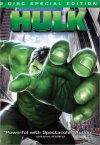BUY THE DVD:
|


|
|
|
SYNOPSIS:
| |
a geneticist's experimental accident curses him with the tendency to become a powerful giant green brute under emotional stress.
|
|
|
MOVIE FACT:
| |
ang lee turned down terminator 3: rise of the machines to direct this film.
|
|
|
RATING:
|

one out of four possible stars
|
|
|
|
If Eric Bana was the subject of a documentary on the Discovery Channel, much of the program would be devoted to determining exactly what type of wood Bana most resembled. Pine? Plywood? Particle board? Like the lead actor, there is nothing in The Hulk that doesn't resemble a piece of emotion-free plywood or a computer generated image. Whether the camera is focused on live actors or upon something that was created inside a computer, this hulking film runs too long on time and too short on personality. The players might be beautiful, but one cannot create a film based solely on the physical attributes of a group of nice looking actors.
In a movie that takes the idea of human emotion so seriously, it's hard to understand how the actors could be so devoid of it. But barring further complaints on the actors, the only recourse for a viewer of this film is a complete and total focus on the special effects. This film really only becomes entertaining when the "Hulk" is swinging pieces of military equipment (like tanks and helicopters) and when the floor of the theater shakes because of the preponderance of bass used in the soundtrack to make it seem as though The Hulk is actually stomping around out in the desert somewhere.
So while the sound design is stupendous (when surrounded by the latest speaker technology located in your nearest gigantic multiplex), one has to put far too much effort into enjoying the technological feats of this film to really enjoy the overall experience. The reason 2002's Spider-Man (another comic book based theatrical delight) made an incredible amount of money is not because of the special effects. It's because audiences loved the characters. Tobey Maguire and Kirsten Dunst made quite the put-upon duo. 1989's Batman also made the leap into gigantic box office not because of its special effects, but because Michael Keaton made one hell of a Batman and because Jack Nicholson was a bad guy audiences loved to hate.
The effort placed on family and personal identity in this film seems all for naught, as the actors don't really have the "oomph" to make their characters very memorable. Which is surprising, given that Jennifer Connelly won an Academy Award last year. If anything, a few of the supporting actors made more of an emotional impact on the audience than either of the two leads. The performances of Sam Elliott (as Connelly's military father, "General Ross") and Josh Lucas (playing the evil scientist, "Talbot") made the most explosive impacts (they both throw things and yell quite a bit) of the film. Even the drunk and disorderly Nick Nolte made his character a colorful one, despite being handed some of the worst dialogue of the film.
When Eric Bana, as Bruce Banner, is in his unaltered human form, he's as interesting as a wooden stump. And when he's the angry Hulk, he's nothing more than an over-budgeted CGI creation, devoid of any real personality. Suffice it to say, when Eric Bana changed his name to something more easily pronounceable by the movie-going public (he was born Eric Banadinovich), he forgot to add an "L" to the end of his last name. An interesting comment made by one of the filmmakers involved in the making of The Hulk was that a big-time movie star wasn't needed in the title role because the character itself was so much larger than life. But that is where the filmmakers made their biggest mistake. Eric Bana was mis-cast as The Hulk.
His smooth performance may have been warranted at times (playing his girlfriend, Connolly bemoans her emotionally distant ex-boyfriend), but it certainly did not need to be that flat. One has but to see that three separate writers (not working as a team) were given credits on this film to believe that it may have been a project that was doomed from the start. The script is full of lame "action movie" dialogue and vapid exchanges which don't do anything to bring the characters to life. And for having cost one-hundred and fifty million dollars, the special effects in this movie cannot make up for the lack of tangible character development.
The ideas of father/son relationships and father/daughter relationships are touched upon often, but those relationships fall flat most of the time because they are hammered into the script and over-simplified. Part of what makes the comic book industry so unique is that defining sense of character that labels each super-hero as unique. Whether it comes from that character's present circumstances, his "power," or his history, comic book characters become popular and sympathetic because of their humanity - even when that humanity is pushed far to the back of a character's consciousness. The Hulk on celluloid might look like a million bucks, but at the end of the day, will anybody really care about him?
Review by: Kelsey Wyatt.
Post Script: I could spend an age complaining about the split screen techniques used in this film and how incredibly annoying they became after their constant, unyeilding use, but it's easier just to say that even simply sitting back and "watching" this film is a trial. Message to the cinematographer, editor, et al: this is 2003, not 1973, and split screens only work today when they are used in jest. For example of proper use, please see Austin Powers.
Review by Kelsey Wyatt.
| |
|